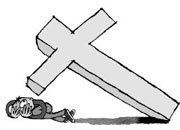WHAT ABOUT the victims?
In story after story on TV and in print, Catholic Church sex “scandal” expos鳠 are focusing on the willingness of church administrators to shuffle priests with clear records of pedophilia around to different parishes where they could, depending on your view, either get a fresh start or find a new batch of kids to victimize in an unsuspecting community. It’s grown from a local Boston story to an international scandal, but U.S. media coverage has predictably focused on the response of church authorities, up to and including (indirectly, gently, and far too late) Pope John Paul II. The coverage has been exhaustive, and in it all, only one class of people seems to have been completely forgotten.
The victims.
It’s notable how little the unique awfulness of these crimes has been examined (let alone harped on) and how few victims’ stories have been told. Here we have children (mostly teens, but also preteens) violated not just by any adult, not even just by an authority figure, not even just by a representative of one’s faith, but by—given the doctrine of the Catholic faith—a direct representative of God himself.
And the abusers in these cases have more power than usual to threaten the victims should they tell. Most abusers can threaten bad things, but few have not only the capacity to promise an eternity in hell but an apparent ability to personally and literally deliver on the promise.
Victims of childhood sexual abuse, especially ones either trapped in an ongoing abusive situation or forced to live for years with their “special secret,” commit (or try to commit) suicide at a rate much higher than average. They also tend more often to act out in a number of other self-abusive or sociopathic ways. We’ll never know what the human toll of the epidemic of abuse now being obliquely described actually amounts to—the lives lost or ruined—because only the most healed, least damaged, and most courageous (and alive) are now coming forth, even years later. And their stories, inevitably, will be mixed in with opportunists and crackpots whose stories are fictitious.
All of which is important to remem- ber when muttering that Mary Kay Letourneau’s victim, the now-18-year- old Vili Fualaau, also back in the local news, is making a complete ass of himself. No young teen has the maturity to make good decisions when an adult takes an unnatural interest in him or her—especially, as in the case of Letourneau, when the abuser has exceptional power to reward or punish the victim. A guy is no less vulnerable to such supplications than a girl.
Fualaau’s case is over the top in a surreal sort of way—one that suggests that either he, his family, or both are still deep in the emotional vortex of a crime. In asking the court to award him $1 million because the school district didn’t “protect” him from the married Letourneau, it’s a little difficult to overlook that he says he needs it because the $180,000 he’s already made from media and book deals is supposedly all spent (he and Letourneau co-wrote a book detailing their “love”; shame on the publisher, ghost writer, and any sick fucks who bought it); or that the “couple’s” second child was conceived after the whole mess became a made-for-Jerry-Springer public spectacle (a life conceived to drive up the movie bid prices?); or that in last week’s testimony, Fualaau detailed years of emotional distress, substance abuse, institutionalizations, and suicidal tendencies due to the morass, but still says Letourneau is “the best thing that ever happened to me” because “she took my art seriously.” It’s very easy to think that at some point, it was no longer the school district’s responsibility— especially if Letourneau had no known history of this sort of thing—to prevent a relationship that seems equal parts victimization, media freak show, and get- rich-quick scheme.
The primary culpability of the church—or a school district—is when it knows that an employee, especially one with authority over children, has a “problem” (e.g., statutory rape) and ignores it, covers it up, or worse. Fualaau probably felt, and may still feel, that his relationship with his sixth-grade teacher was a true love nobody else could understand; and it is true that in many ways society’s strictures take a contemptuous view of the amount of responsibility a teen can handle, especially in matters of sex. But Fualaau has also been a crime victim since age 12.
Society’s ban on adults fucking kids is not one of those unfair strictures—it is a uniquely cruel crime, and its impacts often painful to watch play out. The next time you see a Catholic administrator making excuses on TV, or Vili Fualaau making a fool of himself, remember that you are still seeing a crime in progress.







